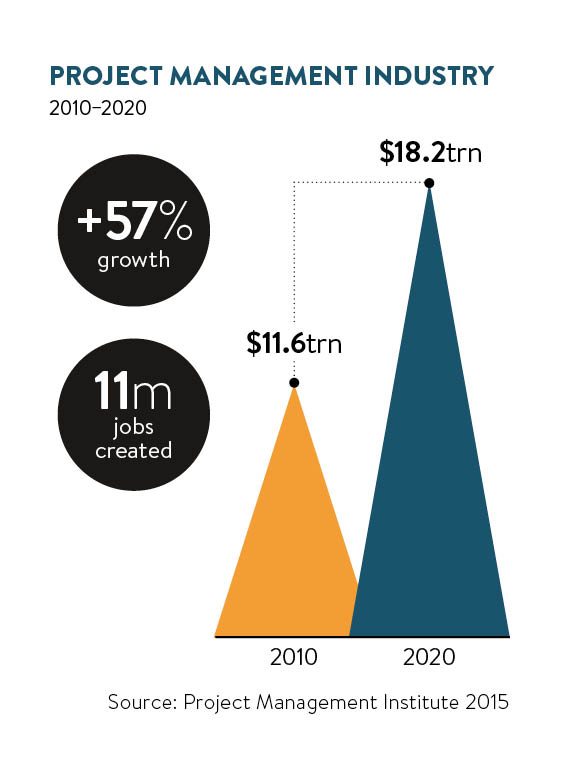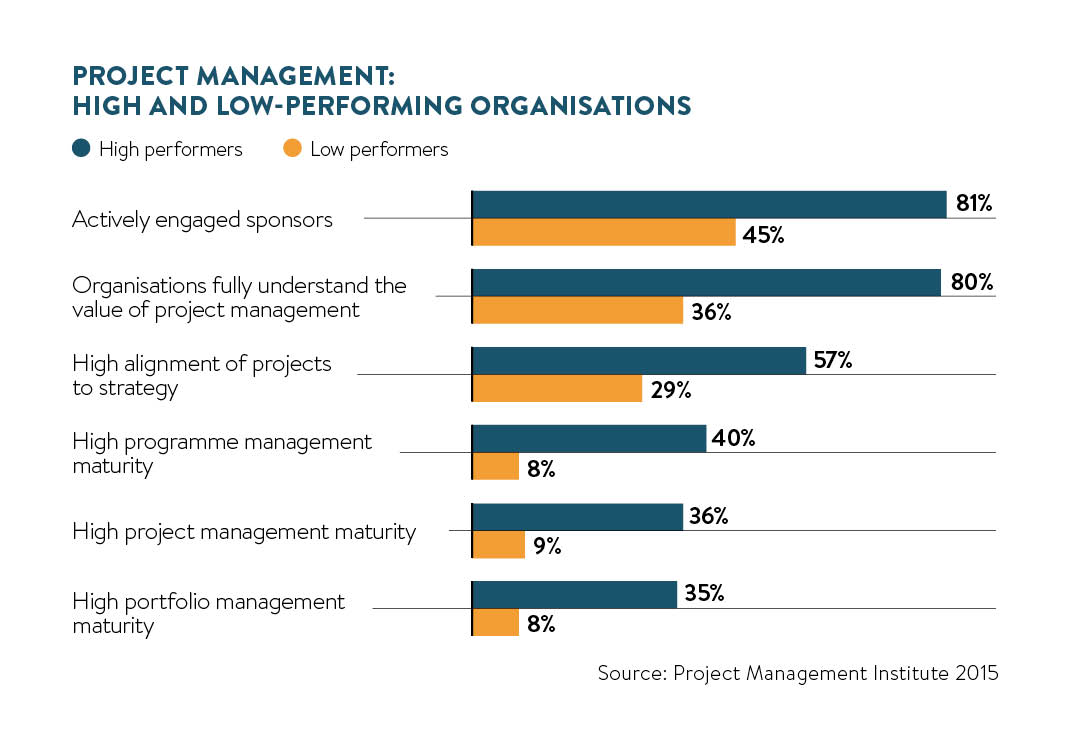Can you have too much of a good thing? With new business breaking down the door and client hotlines ringing off the hook, the world of project management is about to find out.
We have just passed the halfway mark in what the Project Management Institute forecasts will prove a dynamic, decade-long growth trajectory for project management from 2010 to 2020. Market value is expected to mushroom by more than 50 per cent ($6.61 trillion) to reach a total economic impact in excess of $18 trillion.
This global boom in project management is bringing jobs, creating an estimated 11 million new roles, mostly in China, India and the United States. UK employment, meanwhile, is expected to jump to just short of one million jobs.
Innovation at the core
Such spectacular growth prospects set industry pulses racing, but the day job of a professional project manager is not meant to be the stuff of high drama, says Alan Macklin, UK director of government acquisition and support programmes at CH2M UK.
“In part, the objective of project management is to be boringly reliable in delivery of outputs to time, cost and performance, with no surprises. But behind the boring delivery lies the challenge of innovation,” he says.
In Mr Macklin’s analysis, innovation is found in four key areas: advances in information technology; development of enabling concepts, such as agile; expansion into new fields such as finance and pharmaceuticals; and broadening of entry routes into the profession.

Often championed as key catalysts for industry change are the megaprojects. These high-profile schemes enjoy the sheer spend and scale to drive innovation. But does size matter?
According to Professor Andrew Davies, chair in the management of projects, at the Bartlett Faculty of the Built Environment, University College London, there is so much more to project management.
“Size can bring many challenges, but it’s not really the issue,” he says. “What matters are complexity, uncertainty and urgency. All these dimensions call for new innovative ways of thinking.”
Professor Davies contends that the innovation journey in the built environment really began with Heathrow Terminal 5, where efforts were made to bring in new ideas and good practices from other megaprojects and industries: partnering from oil and gas; lean production from automotives; and digital tech from aerospace. This transformative project proved a major learning experience, having a significant influence on mammoth schemes to follow, such as London 2012, Thames Tideway Tunnel and Crossrail with its innovate18 digital platform.
Improving learning capture
It is debatable, though, to what degree learning and knowledge gained on management of major projects actually gets transferred to the wider industry and smaller schemes. Steve Wake, chairman of the Association for Project Management and a thought leader in earned value, recognises this challenge of a roving project management elite.
“The megaprojects are populated by the same herd of wildebeest. To their credit, they are creating learning legacies, so they leave more than their footprints. However, to be of national benefit, these legacies should be brought together in a common database,” he says.
The call to improve learning capture, which can advance professional capability and build industry capacity, is also made by Martin Perks, project director at Mott MacDonald.
“Constant movement of staff between consultants and across the market, becoming integrated into client organisations, means learning is recycled across smaller and more diverse projects,” he says. “However, knowledge management across businesses has to improve on a formal level beyond sharing by osmosis.”

Embracing digital
Digital working and collaboration can be a key driver of innovation and knowledge transfer, with project management part of this global megatrend, says London Underground director of capital programmes David Waboso.
“Project management is moving with the digital age, with things like useful apps for staff that give them a mobile risk assessment tool to summarise incidents, allowing timely and informed decisions to be made on the go,” he says.
The opportunity is there to bring in young project managers who have the vision of how technology can be used
For David Swallow, programme director at Atos, digital promises a solution that could, though, become a problem for project management. “Digital and the internet of things are already changing the landscape of project management,” he says. “The pace is very fast and great strides have been made to leverage obvious benefits.
“The opportunity is there to bring in young project managers who have the vision of how technology can be used. However, young people coming into the industry have had tablets and iPhones for half their lives. They will be horrified when they see the technology they have to put up with at work and will vote with their feet. As a discipline, project management will have to find a way of delivering change that feels as easy as downloading an app.”
Growing pains
Described as a young profession, project management is facing growing pains. Fears of skills shortages are well founded, admits Mr Macklin.
“There will be a significant scarcity of supply and successful delivery experience takes time to build. In addition, the UK does not have the skills required in project controls to deliver the National Infrastructure Plan,” he says. “The good news is we have a higher education platform on which to build these skills.”
In pursuit of maximum capacity and capability, project management cannot afford to be insular or exclusive, either, argues Mr Swallow. He says: “We also need to make sure people from every discipline have project management skills. As project management has become more professional, other disciplines have abdicated their need to focus on budgets and timelines. Project management skills are critical for technicians and change-agents too.”
In the face of onrushing global demand, this placing of human resource at the centre of the plan for the future of project management makes for clarity and conviction, concludes Mr Wake. “The modern project manager is about mindset, not toolset. We have all the method we need. It’s all about people,” he says.
Innovation at the core

Improving learning capture

